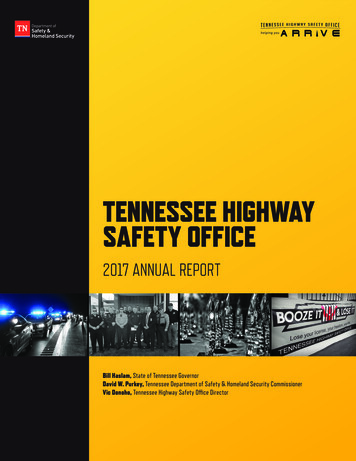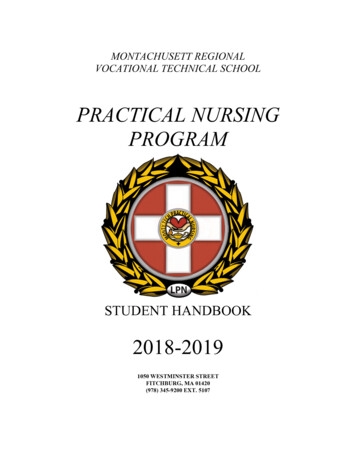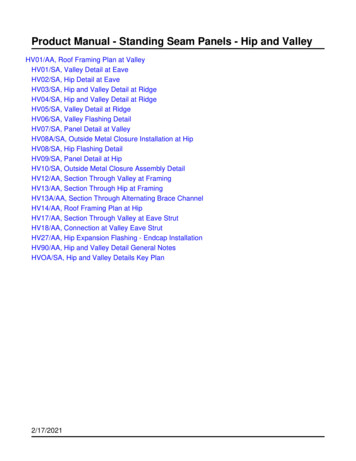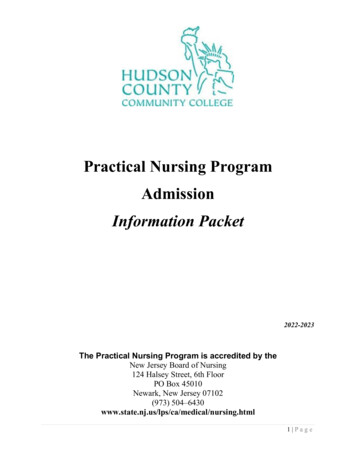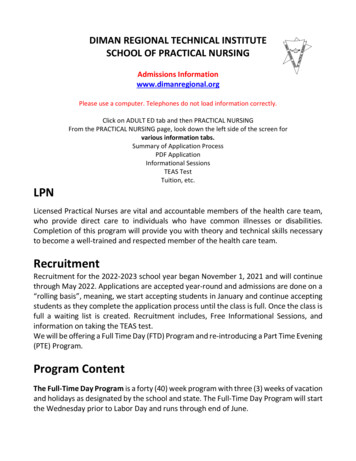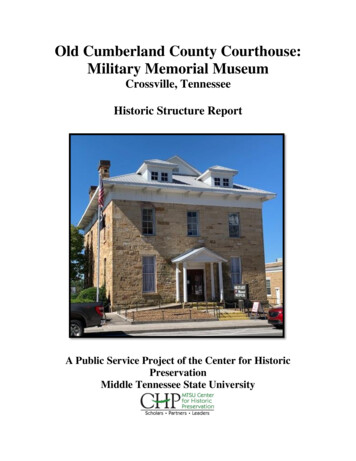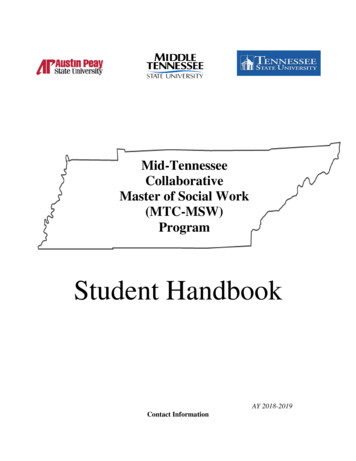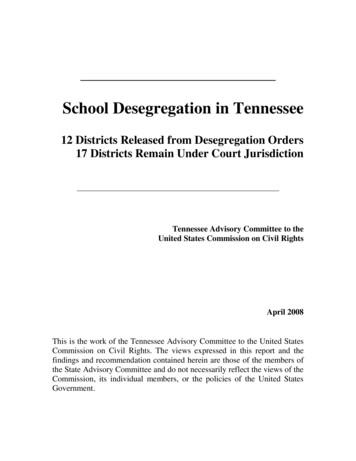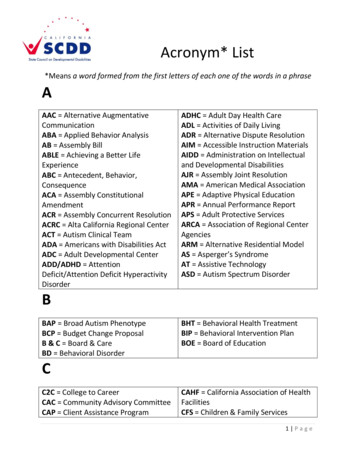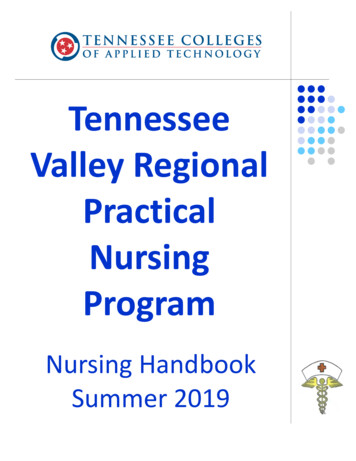
Transcription
TennesseeValley RegionalPracticalNursingProgramNursing HandbookSummer 2019
TENNESSEE VALLEY REGIONAL PRACTICALNURSING PROGRAMTennessee College of Applied Technology Shelbyville1405 Madison StreetShelbyville, TN 37160931-685-5013UTSI Campus1940 Elk River Dam RoadTullahoma, TN 37398931-685-5013Tennessee College of Applied Technology McMinnville241 Vo-Tech DriveMcMinnville, TN 37110931-473-5587
MISSION STATEMENTThe Tennessee Colleges of Applied Technology continue to serve as the premier providers for workforce developmentthroughout the State of Tennessee. The Colleges fulfill the mission by: Providing competency based training through traditional and non-traditional learning instruction delivery systemsof the highest quality that will qualify individuals for employment and/or advancement in jobs;Providing high quality training and retraining of employed workers;Providing high quality training that is economical and accessible to all residents of Tennessee, thereby contributingto the economic and accessible to all residents of Tennessee, thereby contributing to the economic andcommunity development of the communities we serve.The Tennessee Valley Regional Practical Nursing Program mission is to provide the technical instructions and skillsdevelopment for the students to become gainfully employed in the nursing field.DEFINITION OF PRACTICAL NURSINGPractical Nursing is defined by the Nurse Practice Act of 1967 (Tennessee Senate Bill 375) as follows:“The practice of practical nursing means the performance for compensation of selected acts required in the nursing care ofthe ill, injured, or infirm and/or carrying out medical orders prescribed by a licensed physician or dentist or professionalregistered nurse. The licensed practical nurse shall have preparation in and understanding of nursing, but shall not berequired to have the same degree of education and preparation as required of a registered nurse.” This law is effectiveSeptember 1, 1967.PHILOSOPHYWe believe that:The practical nurse is an integral part of the nursing team and that the practical nurse should be trained in anorganized nursing program.Only persons who are mature, of good character, in good physical and mental health and who have sufficientinnate intelligence to profit by the instruction should be selected for practical nursing classes.The curriculum shall include both theory and supervised clinical experience, and the learning experience should beplanned and related to provide a logical sequence and continuity of learning.The content of the curriculum shall include both classroom and clinical situations; and the content of each courseshall cover everything within the law, which is necessary for carrying out competently the duties of the practical nurse in abeginning nurse position.During the clinical phase of the instruction, the student shall be placed in an environment using the sameequipment and the same procedure as used in that health care facility.The community will be involved in the practical nursing program through the local advisory committee.1
PURPOSEThe purpose of the practical nursing program is to provide a quality education in a positive learning environment. Our goalis for the graduate of the program to obtain the basic competencies needed to obtain licensure as a practical nurse and gainemployment in the field.OBJECTIVEThe objective of vocational education is to instruct individuals in occupational skills to meet the demands of specific jobs. Itinvolves the development of skills, abilities, attitudes, understanding working habits and wok ethics that result in asatisfying useful life of work and good citizenship. Additionally, the practical nurse will attempt to meet other objectives,which will aid the improvement of health, the recovery from illness or the support in death of those coming into his/hercare.Upon completion of the course, the graduate will be able to: Understand the functions of the practical nurse on the nursing team.Practice basic nursing in a safe manner and understand related information necessary for a beginning nurse.Appreciate health as related to the individual, the family, and the community.Demonstrate a beginning skill of understanding behavior in relation to patients, co-workers, family and friends.Recognize scientific principles, which form a background for nursing.Demonstrate communication skills in observing and reporting.Develop and demonstrate competency in theory and clinical performance, leading to eligibility for graduation andNCLEX.Recognize the need for continued self-direction in personal and vocational growth.Give nursing care to clients under the supervision of a registered nurse, licensed physician, dentist,ophthalmologist or optometrist.2
CURRICULUM HOURS FOR PRACTICAL NURSINGCOURSEHOURSWork Ethics18Basic Nursing(Professional Vocational Relations, on of Medications/Basic IV Therapy80Medical-Surgical Nursing I and II201Pharmacology111Mental Health Nursing60Maternity Nursing60Pediatric Nursing60Advanced Professional Vocational Pediatrics36Mental Health45Total Program HoursRevised 12/20/1731,296
CONFIDENTIALITYConfidentiality means that your conversations with patients and your nursing observations and assessments are to beshared only with the appropriate healthcare givers in the proper setting. What you record and show to the patient andother health professionals is never to be shared with anyone else. Don’t discuss patients in the cafeteria or the elevator;you may be overheard.We abide by all HIPAA (Health Insurance Portability and Accountability ACT) laws and a student who “breachesconfidentiality” will be subject to disciplinary action, which may include immediate termination from program.STUDENT CONDUCT POLICYStudents are expected to conduct themselves in an acceptable manner at all times. Individual or organizationalmisconduct, which is subject to disciplinary action or termination, shall include, but not be limited to the followingexamples:1.2.Failure to cooperate with the school’s or affiliating agency’s supervisors and/or instructors.Plagiarism, cheating or other forms of academic dishonesty in the classroom and/or the clinical setting isprohibited.3. Inefficiency, inability and/or gross or repeated negligence in performance of assigned clinical duties are groundsfor dismissal.4. Altering, falsifying or making a willful misstatement of facts on any patient’s record or chart is prohibited.5. Leaving clinical without permission is prohibited.6. Receiving personal visitors in the classroom or clinical facility except in an emergency or with prior approval of theinstructor.7. NO PRESENCE OF CELL PHONES.8. Students must call if they are not going to be present at least one hour prior to clinical beginning.9. If you are unable to complete clinical you are unable to graduate; this includes facility requesting students to notreturn.10. Students are responsible for any statements made on social venues (Facebook, etc.) and realize there may beconsequences for postings.4
ATTENDANCE POLICYThe nature of the nursing programs at the Tennessee Colleges of Applied Technology is such that it is necessary for everystudent to attend regularly. Excessive interruptions due to absences will have an adverse effect on student progress.Students must call the clinical area at least one hour prior to clinical if not going to be present.Due to difficulty making and completing assignments in the clinical area, students will NOT be allowed to attend clinical lessthan assigned hours per day. Therefore, if you are more than 15 minutes late or need to leave early you will be counted asabsent for total number of hours for that day. Clinical absences are cumulative throughout program. Any missed clinicalday is an unsatisfactory.The Practical Nursing Program has a fixed number of hours, (1296), and a designated time frame (12 months full-time, 16months part-time), to complete the courses; therefore after a student has been absent for a total of 25 hours (20 hourspart-time) in a trimester, the instructor will refer the student to the Student Services or Administration Office forcounseling.It is the responsibility of the student to attend all scheduled classes, laboratory sessions, and conferences.A student absent for three consecutive school days without contacting the school may be automatically terminated.Students should be punctual, including returning from lunch and break.*NOTE: When a student has missed more than 42 hours in the full time program and 30 hours in the part time programin one trimester, he/she may be terminated from the Practical Nursing Program.A student is considered tardy if not in the classroom, in his/her seat, at the designated time for class to start. NOTE: Thisincludes returning from lunch and breaks at the designated time.An attendance record for each student is maintained by the nursing faculty.NOTE: Students arriving late to the classroom will be charged as follows: 1 to 30 minutes will be counted as 30 minutes31 to 60 minutes will be counted as 1 hourAny doctor’s appointment other than emergencies should be made after completion of the school day.HOURS ABSENT SHOULD BE RESERVED FOR TRUE EMERGENCIES ONLY!5
GRADING SYSTEMLaboratory performance requires satisfactory completion of each skill. The student will be allowed three attempts. Ifunable to satisfactorily complete each skill by the third attempt the student will not be allowed to continue in the program.TheoryA 94 - 100B 87 - 93C 80 - 86Below 80 is failingIf tardy or absent for an exam, student will not be allowed to take exam. One re-take exam per course for excusedabsence. The re-take exam may be a different exam. There will be NO make-ups for final exams.An excused absence includes:1.2.3.Illness of immediate family member--documented by written statement from physician--must be seen bya doctor.Death in the immediate family--documented by written statement.Scheduled court appearance--documented by written statement.Passage of Pre NCLEX review test (Comprehensive Exam) is required. If not passed the first time, remediation is required.This remediation will continue until performance standards are met. There will be an additional charge for additionalstandardized tests.Theory grades are based on written tests and completion of all assignments (written, oral and computer). A minimum finalaverage of 80 must be made in each subject area to remain in the program.Students are responsible for keeping track of their progress in the program. It is the student’s responsibility to seekcounseling when having difficulty in a particular area.6
CLINICAL PERFORMANCESuccessful clinical performance is essential to completion of the practical nursing program. Students must successfullycomplete the preceding trimester clinically to continue to the next trimester. A grade of Pass or Fail will be given.Each student is evaluated weekly. An overall written record of progress and a clinical performance evaluation is given toeach student at the end of the rotation. The conference includes the student and one or more instructors.CASE STUDIES/CAREPLANS/CARE MAPS are the essence of the nursing process and evaluate the student’s ability to: obtain a complete history and physicalevaluate and interpret lab results, medications and treatmentobtain a social history and relationship to medical diagnoses, treatments and etiologyassess the patient’s needsdetermine appropriate nursing measures for those problemstranslate nursing theory to practicedetermine if patient problems are resolvedCLINICAL PROBATION - A student is placed on clinical probation after three (3) unsatisfactory evaluations. NeedsImprovement (NI) may be given for areas that do not meet clinical expectation. Three (3) Needs Improvement in one areaequals one unsatisfactory. The student will be counseled regarding the cause for probation, and suggestions forimprovement. This information will be documented and signed by all concerned parties, and placed in the student’s file. Ifthe student’s clinical performance does not improve with the next evaluation period, the student may be terminated fromthe program.Clinical Area:1.2.3.4.5.6.It is the responsibility of the student to be in the clinical area promptly and in proper uniform.Clinical hours are as assigned per each campus. Any absence or tardiness should be reported to yourinstructor at the clinical site no less than on hour prior to the time to report to clinical.The student is to be prepared for clinical. Failure to be prepared may result in dismissal for the daycounting time as absent.A student under the direct supervision of an instructor may perform medication administration andnursing procedures. At NO time will a student perform any invasive procedure unless directly supervisedby an instructor.Due to difficulty making and completing assignments in the clinical areas, student will NOT be allowed toattend clinical less than assigned time. Therefore, if you are more than 15 minutes late or need to leaveearly you will be counted as absent for the entire day’s hours.Students may not trade clinical sites with other students without written permission.AFFILIATING AGENCIESEach campus will assign students to clinical agencies. Students will be required to rotate through all agencies as assignedby the nursing faculty. Students will be dismissed if unable to rotate through all agencies.UNSATISFACTORY PERFORMANCEUnsatisfactory performance in classroom or clinical will not be allowed. A total of four (4) documented unsatisfactoryperformance issues may be grounds for dismissal. Unsatisfactories are cumulative throughout program; for each clinicalabsence students will be given an unsatisfactory.7
UNSATISFACTORY POLICYThe student must not threaten the physical and/or psychological well-being of a patient by his/her performance. If thisoccurs at any time, the student is in danger of failing the nursing program.A student is held accountable for any real/potential threat to the patient on every skill previously taught. If the instructorprevents an error, the student is still at fault.A behavior or consistent behaviors that result in a threat to the patient’s physical and/or psychological well-being is termedunsatisfactory behavior. Examples of unsatisfactory behaviors include, but not limited to the les learned previously are violated. (Example: a break in aseptic technique during catheterinsertion.)Inappropriate verbal or non-verbal behavior in the presence of the patient, family member and/orhospital staff.NO provision for means of communication for a patient.Neglecting to wash hands before and after nursing procedures per facility protocol.Demonstrable lack of progress in performing clinical skills.Criticizing patient.Communicating negative value judgments to patient.No provision for privacy.Demonstrating incompetence/lack of preparation in patient’s presence.Accepting an assignment while under the influence of narcotics and/or alcohol.Medication errors.Inappropriate posting on public venues.Cell phone in clinical area.Failing to turn in clinical paperwork on due date.Medication errors are counted as an unsatisfactory and are cumulative during the program.Definition of Medication Error:a.Violation of the eight rights during preparation and/or administration of the medication.b.Right PatientRight DrugRight TimeRight DosageRight RouteRight to RefuseRight to KnowRight DocumentationOmission of medication on a patient as scheduled.c.Medication given without the instructor’s approval at any time during the program.Rationale: The administration of medicine is critical to the welfare of the patients. Students must learn early the necessityof accuracy in medications. When a medication error is committed, the clinical agency requires documentation. Werequire the error be documented on a counseling form and kept in the student’s file.Four Unsatisfactory incidents throughout the program may be grounds for immediate termination from the nursingprogram.8
Procedures:1.2.3.Unsatisfactory behavior(s) will be documented on the student’s Clinical Evaluation Form. The form willinclude all pertinent information stated concisely, and the behavior(s) will be precisely and specificallyidentified.If the instructor is in doubt or if there are extenuating circumstances, the instructor will meet with the PNCoordinator and/or one other faculty member to make a decision about the unsatisfactory behavior.A student/instructor conference will be held after the unsatisfactory behavior has been documented toreview the behavior, make recommendations, and obtain the student’s comments and signature.HEALTH AND ACCIDENT POLICYAll students enrolling in the Tennessee Valley Regional Practical Nursing Program are required to complete a MedicalInformation Form. This information will be needed if the student becomes seriously ill or involved in an accident on theschool campus or clinical site. In cases of emergency, students may be taken to a hospital or physician. It is the student’sresponsibility for any charges accrued at this time.Due to the nature of nursing and the possibility of acquiring infectious diseases, students are encouraged to have sometype of health insurance during the program. Students will be taught Universal Precautions and we require the student toobtain the Hepatitis B Vaccine series. If, however, a student sustains a needle stick or other accidental injury and must betreated at the clinical site, this will also be at the student’s expense.STUDENT MALPRACTICE INSURANCEPractical Nursing students are required to obtain professional liability insurance. Students will be required to pay thenecessary premium selected by the Practical Nursing Program.CLASS RULES AND REGULATIONS1.2.3.4.5.6.7.8.9.10.11.12.13.CELL PHONES ARE NOT ALLOWED IN CLASS.Talking is prohibited during the class lecture and study time.Eating and drinking is allowed in the classroom and lab at the instructor’s discretion.Smoking is permitted in designated areas only. The Tennessee Colleges of Applied Technology are smokefree buildings. Smoking in only permitted 20’ from building and doors.Students are responsible for some housekeeping chores in the classroom and lab.Please observe the 15MPH speed limit in the parking area.The hearing process is applicable to all students. A copy of Guideline NO. AVTS-023 may be obtained inthe administrative office, which details the hearing procedures.Computers located in the school are for educational purposes only.Examinations may NOT be removed from the classroom, nor may questions from examinations be copied.Failure to comply with this directive may result in dismissal from the program.Students are asked to be alert during class time and responsible for attending all lectures, includingvideos.Respect to peers and instructors shall be the norm; not the exception.Students are expected to notify the instructor when leaving early or coming in late.Scrubs MUST be worn to class daily.9
CLINICAL DRESS CODE1.2.3.4.5.6.7.8.9.10.11.12.13.14.15.The student uniform is to be clean, wrinkle-free, ironed and in good repair. A dress is worn no shorterthan knee length. Shoes are to be clean and in good repair.The complete uniform is to be worn with appropriate under-garments, including white hosiery withdresses.Hair is to be worn neat and clean. If long, hair must be worn away from the face and up off the collar.Extreme hair fashions or ornaments are not acceptable.Jewelry, while in uniform, is limited to facility policy.Nails are to be clean and short. Nail polish, acrylic nails, or gels are not allowed.No perfumes are allowed in the clinical area.Shoes are to be all WHITE and leather. No cloth tennis shoes. All white socks with no decorations or hosemay be worn with pants.Name badge, watch, stethoscope, scissors, and pen light are part of the uniform.A lab coat may be worn in clinical if desired.Excessive or heavy makeup is not allowed. If in doubt, ask your clinical instructor about appropriatemakeup.All tattoos must be covered while in uniform.Any instructor may excuse a student from the clinical areas if his/her personal appearance and/or hygienedo not meet the appropriate area dress code. The student will be documented as absent for the day.When street clothes are worn, clothing must be clean, neat and professional; lab coats, with name pinmust be worn. No jeans, shorts, bare midriffs, or flip flops.Smoking Is NOT permitted while in uniform on any clinical day.Sideburns, beards and mustaches will only be allowed if kept clean and neatly trimmed close to the faceand if allowed by clinical facility. Sideburns must be kept at or above the earlobe level.CONDUCT POLICY IN CLINICAL SETTINGConduct codes are specific for the nursing program, as students are functioning in a clinical setting where visitors, familymembers and hospital staff constantly observe behavior. Violations of this policy may lead to immediately dismissal fromthe nursing program.1.2.3.4.5.6.7.8.9.10.Hospital business is highly confidential - information must not be revealed, discussed or photocopied.Patient records are protected documents and are NEVER to be revealed without due process.Students are required to show respect for peers and faculty.The Nursing Instructor’s approval is required before the student may leave the facility floor.Students are required to exercise Standard Precautions at all times.Students are required to exercise professionalism at all times.To protect the well-being of the patient any student that is chemically impaired or otherwise cognitivelyimpaired while in clinical, he/she will be dismissed from clinical and sent home at the instructor’sdiscretion. This is grounds for dismissal from program.The use of any medication that is not prescribed to the student for medical purposes, use of illicit drugsand/or alcohol is strictly prohibited.No smoking.No cell phone.10
POLICY OF THE TENNESSEE VALLEY REGIONAL PRACTICAL NURSING PROGRAMREGARDING USE OR ABUSE OF DRUGS OR ALCOHOL AND BACKGROUND CHECKSDrug and Alcohol Testing Testing Prior to the Clinical Experienceo Student should be aware that the clinical facilities with which the campus contracts may requiresuccessful completion of a background check and a drug/alcohol screen prior to commencement ofparticipation in the clinic. Testing positive will result in termination in the program.Reasonable Suspicion TestingNursing students engaged in clinical/classroom activity may be required to undergo a blood or urine screening fordrugs and alcohol if reasonable suspicion exists to believe the student is using or under the influence of drugs oralcohol such as to interfere with the safe performance of duties.Prior to testing, the student will be asked to sign a Statement of Understanding and Consent to Drug/AlcoholScreen. A student who refuses to undergo testing will be subject to termination.Testing positive will prevent the student from continuing in the program (termination).HEALTH CARE RULESThe student must maintain a good health status to work in the clinical arena and perform the duties of a practical nurse.You may not attend clinical if you are ill.All illness should be reported to the instructor at the beginning of the class or clinical day. If unable to be present, you mustnotify your instructor. If absent for a serious illness, or injury, written permission must be presented to return to school.Emergency care is available at the local emergency room or a private physician of choice. Each student is responsible forhis/her expenses for services rendered.WORKER CHARACTERISTICSThe Tennessee Colleges of Applied Technology reserve the right to dismiss any student who finals to conform to theprogram policies and guidelines. Excessive tardiness, absenteeism, unsatisfactory grades, falsifying records, intoxication,drug abuse, and violation of confidential records are causes for immediate dismissal. Students are responsible for keepingtheir area neat and clean at all times. Students should report any unsafe conditions or items needing repair to a facultymember. Housekeeping is a part of nursing and a sanitary work area is essential to a healthy environment.11
WITHDRAWALAn official withdrawal requires:1.2.3.4.An official withdrawal form must be completed.Any student who withdraws, but wishes to re-enter a later class must reapply and complete all admissionsrequirements. The student’s request for re-admission will be reviewed.Any student who is terminated because of academic failure MAY be allowed to re-enter the TennesseeValley Regional Practical Nursing program with the recommendation of their instructors.Any student who terminates twice will not be allowed to re-enter the Tennessee Valley RegionalPractical Nursing Program, which includes TCAT Shelbyville and TCAT McMinnville.TRANSFER STUDENTSTransfer students are accepted into the Practical Nursing Program. A transcript and recommendation from the previousschool of nursing is required. Each transcript is evaluated according to the Tennessee Valley Regional Practical NursingProgram requirements.The student may be asked to test in certain areas to prove competency.There will be a probationary period of one trimester for all transfer students.PROMOTION AND GRADUATIONStudents will be evaluated on a continuing basis. The student must pass with an eighty percent (80%) in each theorysubject. The student must pass clinical rotations and receive a passing grade on the NCLEX review test.Graduation shall depend upon satisfactory completion of total requirements of the program. Eligibility for writing the stateboard examination will require completing forms before graduation.TRANSCRIPT AND LICENSUREAfter all theory and clinical work have been successfully completed, the student will graduate and will be recommended totake the NCLEX. All information, State Board of Nursing application and transcript will be sent to the Tennessee Board ofNursing. An appointment can then be scheduled for the student to take the NCLEX.12
Valley Regional Practical Nursing Program . TENNESSEE VALLEY REGIONAL PRACTICAL NURSING PROGRAM Tennessee College of Applied Technology Shelbyville 1405 Madison Street Shelbyville, TN 37160 931-685-5013 UTSI Campus 1940 Elk River Dam Road Tullahoma, TN 37398 931-685-5013
